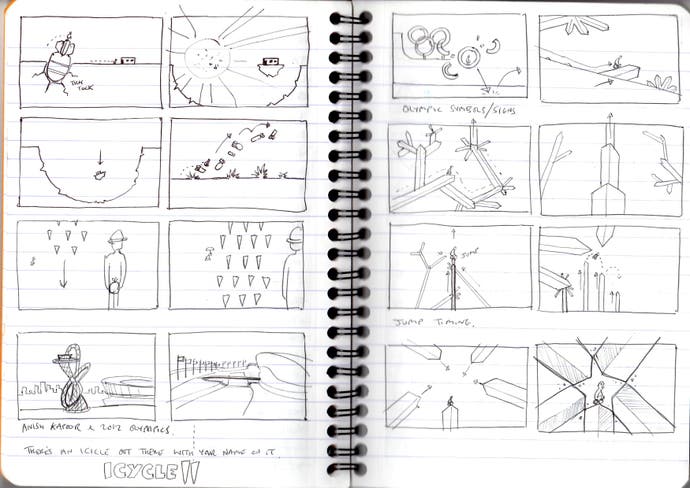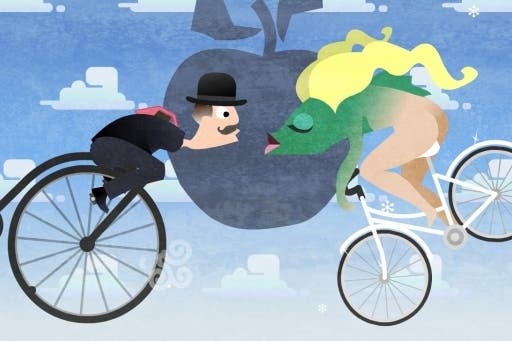Reece Millidge and the power of gimmicks
What the games industry can learn from the world of adverts.
Do you remember the famous Honda ad with the diesel engine that went scudding around the countryside, making the world beautiful? The one with the flamingos and the whistling and with good old Garrison Keillor singing a song about the power of hating things? Can hate be good/ Can hate be great/ Can hate be something we don't hate? Reece Millidge helped make that.
"The Honda Grrr campaign was the ad that really put our company on the map," Millidge laughs, casting his mind back to the years he spent working as a commercials animator. "It was basically a diesel making the world clean: it was absurd. Anyway, we expanded from a company of about six people to about 60, and when a company expands like that, it means there's always a new space to fill. I went around and did a bit of texturing, modelling, compositing, pre-production, post-production - a bit of everything. It was the perfect grounding for an independant developer."
And that's what Millidge is up to these days, hacking away in Brighton as one man micro-studio Damp Gnat. He's made glorious browser games like Wonderputt , which uses crazy golf to explore everything from the water table to the workings of a torpedo, and he's just finishing Icycle: On Thin Ice - an iOS reimagining of one of his early Flash efforts, and a touchscreen treat that should be available later this year via a publishing deal from Chillingo.

Icycle - let's get this out of the way now - is extremely beautiful: an explosion of colours and shapes that zips from Magritte to childrens books and on to old propaganda posters in a matter of a few minutes, while you guide an unfortunate naked man who's riding a tiny bicycle across a vast frozen landscape.
It's an extraordinary journey, and within it you'll find the key to Millidge's whole approach to game design. The first time you look at Icycle, you expect it to be a simple endless runner - a pretty one, perhaps, but another straightforward slog for milestones and coins that keeps you coming back with the promise of eternal hi-score glory.
That isn't the case, though. Icycle's levels are short and filled with tricks and gimmicks - often clever bits of business that are introduced, used for a few seconds, and then discarded forever. You might get boinked on the head and find yourself inside a French surrealist painting riding a penny farthing. You might find yourself in a frozen warzone, drilling a path through the topsoil by setting off mines.
Icycle is the most bespoke game I've ever played, in fact, because you feel as if everything is created purely for the specific moment you encounter it and with no thought for its future re-use. It's all oddly lavish. Like Brendon Chung, the creator of Thirty Flights of Loving, Millidge is an editor and cinematographer as much as a straight-up designer, too. There are cuts in Icycle - hilarious juxtapositions and sudden transitions to close-up.

Even when it's sufficiently clear Damp Gnat's latest is no endless runner, you're still waiting for the game to settle down, to stop flinging new gimmicks at you. And then it becomes Millidge who's doing the endless running. You start to wonder: how long can he keep coming up with new stuff? I've ridden skyscraper icicles through caves of spikes, I've drifted to the bottom of the ocean and romanced a terrifying fish, so what's next? Can he really keep this going?
Millidge puts a lot of this unusual approach down to his background in advertising. Although he'd dabbled with games before he went to college - creating Odyssey for the Amiga 500 with his school friend Chris Mullender - it wasn't until he started making ads for the telly that he discovered the specific elements that would make Icycle so exciting: the fact that it has such insane respect for its players' time, the fact that it never wants to show you the same thing twice.
"I suppose one of the key things in coming from commercials is that literally every second counts," muses Millidge. "It's like the first few seconds of your commercial are like the start of your breadcrumb trail - it's essential that you hook them from the start. When you've got them for the first few seconds then they're in it for the next ten seconds, and then you're responsible for getting them hooked for the next ten seconds. You have to keep that going for the full thirty seconds."
Crucially, Millidge is talking about a very different approach to hooking players than that which many smartphone games go for - the systemic slog enlivened by progression meters. "Yeah, it's often like there's a system you lock into quickly and that's as far as your expectation goes," he says. "With Icycle, whether it's a gag or just a subtle sub-plot element or a narrative bit or whatever, I try to show you new stuff, I never rely on the rhythm to carry you along."

And sometimes, the key to a good gimmick is letting it breathe. "There's this screen with all these missiles in Icycle," Millidge explains. "You drive over frozen tanks and people with muskets and missiles and they were clearly frozen at just the point they were about to blow each other up. I originally put collectables in that screen, but it actually detracted from the whole point of having that screen in there. I changed it so you might collect a clothing item instead, but then the narrative of that screen was still disrupted by the clothing item. In the end I stripped it all out and that's the one screen where nothing can kill you, you don't collect anything, and there's no challenge. But it's pure narrative. So you literally just whistle along and get on with it.
"I think that's what I'm trying to do with every screen or every level - offer an element of narrative. Because, again, that's what you do in commercials. Every second counts, so you really value someone's time. So why should any other medium be different? If you're looking at a painting or whatever, every medium should be respecting the audience."
Millidge laughs. "With commercials, the responsibility is to get you to see the whole thing and that's so that you're more likely to buy the product - but this is still a good side effect of that, a good grounding and habit to get into: keeping your audience gripped. Gripped on the bespoke stuff. You know..."
For a few seconds, Millidge searches for the right words. "I guess I want players to be entertained rather than just addicted."

